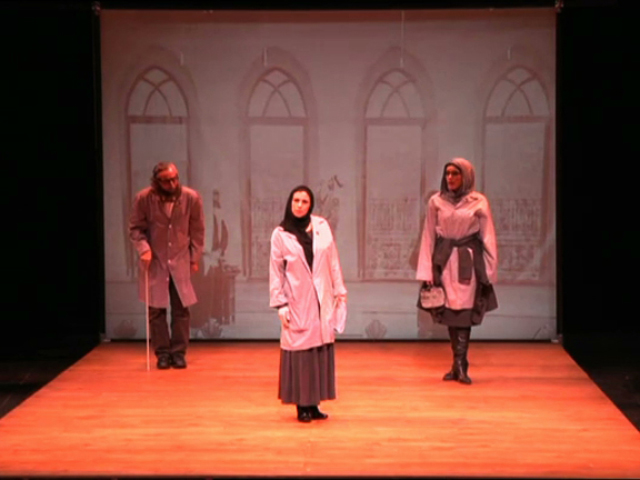About This Clip
The Speaker’s Progress (Twelfth Night)
In a totalitarian state somewhere in the Arab World, all forms of theatre have been banned, but a condemned 1960’s classic play has become the focal point for resistance blogs and underground, dissident Twitter movements…
The Speaker’s Progress uses Twelfth Night as a starting point to explore events in the Middle East, transforming Shakespeare’s comedy into a satire on the decades of political inertia that have fed recent revolts across the Arab region and a daring theatrical metaphor for the mechanisms of dissent. The piece will evolve as circumstances in the region change, emphasizing the rapid pace of revolution among courageous citizens seeking freedom. This is a rare chance to see a major Middle Eastern theatre company’s provocative and inspiring work.
“A new history is finding its voice among the millions across the Arab world who stood up and continue to stand—and fall—for dignity and freedom after decades of shame and oppression. This play, forged at the cusp of these two eras, has the fortune—and the responsibility—to be one of its platforms.”–Sulayman Al-Bassam
About Sulayman Al-Bassam
The internationally celebrated work of writer/director Sulayman Al-Bassam has been awarded the Kuwait State Arts Encouragement Award, Edinburgh Fringe First Award, and the Best Director and Best Performance Awards (Cairo International Festival of Experimental Theatre). Under his direction, SABAB has achieved worldwide acclaim, performing across four continents.
Performance run: October 12 – October 16, 2011
Where: Paramount Mainstage at Emerson College, Boston, Massachusetts
WRITTEN AND DIRECTED BY: Sulayman Al-Bassam
ARTISTIC PRODUCER: Georgina Van Welie
PRODUCTION DESIGN: Sam Collins
MUSIC COMPOSER: Marcus Doshi
COSTUME DESIGN: Abdullah al Awadi
RUNNING TIME: 90 minutes with no intermission
Performed in English and Arabic with English supertitles
Information courtesy of ArtsEmerson site.
Additional details available here regarding the premiere performance.
Essay written by Margaret Litvin:
“Shakespeare in the Arab World: Introduction“
Review of The Speaker’s Progress, directed by Sulayman Al-Bassam. Shakespeare (journal of the British Shakespeare Association), 2013.
Essays written by Graham Holderness:
“Sulayman Al-Bassam’s The Speaker’s Progress: Introduction“
“Arabesque: Shakespeare and Globalisation“
The Speaker’s Progress (Twelfth Night)
Essays
Sulayman Al-Bassam’s The Speaker’s Progress: Introduction
The third installment of Sulayman Al-Bassam’s Arab Shakespeare Trilogy premiered in New York in 2011. The Speaker’s Progress used Twelfth Night as a starting point to explore events in the Middle East.more
The third installment of Sulayman Al-Bassam’s Arab Shakespeare Trilogy premiered in New York in 2011. The Speaker’s Progress used Twelfth Night as a starting point to explore events in the Middle East. The play transformed Shakespeare’s comedy into a satire on the political inertia of the Arab world, and a theatrical metaphor for the mechanisms of dissent. The production was strongly coloured by the ‘Arab Spring’, the succession of revolts against established regimes that have begun to rise up across the Arab world. Al-Bassam comments:
A new history is finding its voice among the millions across the Arab world who stood up and continue to stand—and fall—for dignity and freedom after decades of shame and oppression. This play, forged at the cusp of these two eras, has the fortune—and the responsibility—to be one of its platforms.
In an unnamed Arab country theatres have been shut down and theatrical performance criminalized. From a lectern, a former theatre producer, played by Al-Bassam himself, explains to the audience that what he is presenting is not a play, but a reconstruction of a 1960s production based on the story of Shakespeare’s Twelfth Night. The costumes and set resemble a scientific rather than an artistic context, with the actors wearing laboratory coats. Men and women remain at a distance from one another. An ominous camera sits in front of the stage, suggesting universal government surveillance.
The 1960s production of Twelfth Night, we understand, had the radical spirit of its time, especially in its irreverence toward moral and political authority. We see parts of it parts of it in black-and-white film on a large screen onstage, and hear Shakespearean dialogue adapted to a radical contemporary agenda:
Music is the food of love and love is the blood of freedom and freedom is the mother of progress. . . . How can you transform a country if you don’t put women at its center?
The government-sponsored revival played out on stage tries to empty the performance of any radical sexual or political content. But the actors run into trouble, simply by having a woman dress as a man. Shakespearean drama becomes a metaphor for radical dissent.
The reconstruction is performed by eight actors who are also ‘not actors’, the Speaker emphasizes, but ‘envoys’ from the Tourist Board and the Council of Virtue. Initially the actors obediently deliver the official programme. Gradually they begin to deviate from the script, and wander into politically dangerous territory. They burst into song; women change into dresses and take off their head scarves; they cry ‘Freedom!’ People are arrested; voices are silenced; disobedience repressed. But the energy and humour of the Shakespearean drama continually explodes through the barriers of oppression. The Speakers Progress is Sulayman Al-Bassam’s Arab Spring.
Related Productions
- Nata e Dymbëdhjetë (Twelfth Night) (Mani, Piro; 1982)
- Nata e Dymbëdhjetë (Twelfth Night) (Anderson, Justin; 2018)
- Noche de Reyes (Twelfth Night) (Azurmendi, Jorge; 2011)
- Twelfth Night (Perng, Ching-hsi)
- Twelfth Night (Bow Shakespeare Series #4) (Kimura, Shinji; 1999)





